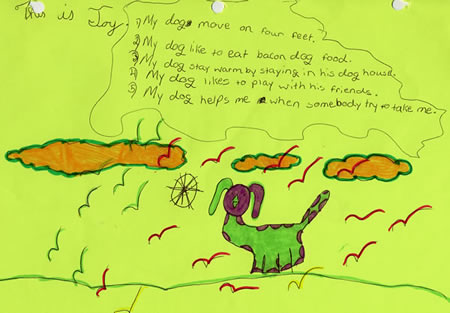ScienceQuest for Youth: A Growing Program
by Jennifer Dorsen
What do you want for the youth in your program?
While each kid has unique needs, there are some common
goals that many of us share, some of which are summed up in the quote above.
Center directors and staff aim to provide a wide variety of things to their
young clients, often with too few resources and too many needs.
Through ScienceQuest, we have developed a program that supports center staff
and volunteers as they reach for these goals with their middle school aged
youth (10-14). In the after-school hours, these youth are exploring the insides
of volcanoes, communing with lions, and comparing pond water to tap water
for health indicators. Others are finding the physics of skateboards, the
daytime habits of spiders, or the workings of robots. As part of a small team,
each child has the chance to make decisions and to become an information sleuth
who presents complex explorations in a well designed website to teach others.
To date, teams all over Boston, in eight surrounding communities, and in
thirteen cities nationally have worked on integrating informal science into
their technology programs. Over two hundred youth have used their CTCs' tools
for learning and presenting information. Eighty-five staff members and volunteers
have been trained to guide these project-based explorations, and each receives
extensive support during the process. ScienceQuest is funded in part by the
National Science Foundation
and supported by Educational
Development Center in Newton, MA. Our partners are the community technology
centers, business supporters, and science museums.
 How
does ScienceQuest work?
How
does ScienceQuest work?
The key element to ScienceQuest is the "I Search," a strategy that
many teachers use and that we have adapted to fit the after-school world of
CTCs. Through this process, coaches (staff or volunteers, but not science
experts) work with a small team of youth through the four stages of investigation.
The first stage is "immersion." As the children explore, they discover
for themselves what interests them, what doesn't interest them, and what they
want to see next. During the immersion phase, they can try some water xperiments,
watch a video on earthquakes, find signs of the coming winter outside the
center, or surf the NASA web site.
Then we ask, what did you learn in each of these activities, and what excites
you to learn more? Some recent questions have been:
- Have there ever been volcanoes in Brockton, MA?
- How do robots work and how do they help people with
disabilities? (Roxbury, MA)
- What sorts of bugs are helpful in a garden? (Yonkers,
NY)
- How do the ants outside the center survive in the heat
of Texas? (Lufkin, TX)
- What’s the nature of the universe? (Chicago, IL)
Once a team has a question that they must answer, the rest of the project
unfolds over ten to fifteen weeks. They make a plan that identifies resources
to help them find information. Some teams go out of the center on field trips,
some talk to experts, and some go onto the Internet to find experiments and
information to learn more. As they do this, they are gathering and creating
content to build their web sites.
In the past two years, we have noticed a few things: the youth involved often
become famous around the center for creating their own web site, and the waiting
list for ScienceQuest grows. Other times, we notice kids finishing up a project
are simultaneously talking about what they will investigate next. One girl
on the Mane Page
team, investigating lions, talked about her questions
about rabbits, since her grandmother keeps rabbits. Bob Hamilton, the coach
at Ministry in Action in Lufkin, TX, reported that the kids are asking for
more time in the center to finish their project, since twice a week is not
enough.

The youth can talk eloquently about what they have done and what they have
learned, and their confidence shows through. While we do not have the capacity
for following the youth through high school and into their post-graduation
choices, we do know that youth engaged in quality after-school programs are
more likely to graduate and have a positive attitude about learning and school.
They show better group skills and make smarter choices about health and activities,
according to the National Institute on Out-of-School Time (NIOST).
The youth in our centers live in complex worlds with increasingly complex
goals for their future success. Through ScienceQuest, youth explore, learn,
have fun and get ever closer to becoming successful adults with a deep understanding
of their world.
 The
ScienceQuest
web site has more information about the project, the
youth web projects, answers to common questions, and a soon to be launched
section of the site for youth. We hope that you will try a ScienceQuest project
on your own or apply to attend one of our workshops at the next CTCNet conference!
The
ScienceQuest
web site has more information about the project, the
youth web projects, answers to common questions, and a soon to be launched
section of the site for youth. We hope that you will try a ScienceQuest project
on your own or apply to attend one of our workshops at the next CTCNet conference!
Jennifer Dorsen is the program director
for ScienceQuest at EDC.
